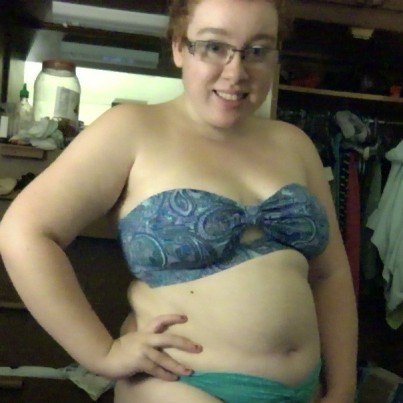My last post here on HuffPost was about how you should interact with me, a fat woman who wears revealing clothing. It sparked a lot of controversy. Many said that I should not be glamorizing obesity, others that I couldn't ask not to be stared at when I'm breaking down social barriers, and others commented that I really don't have it that badly; after all, all woman are body policed, not just fat ones.
The latter point is what I want to explore: how my identity as a woman informs my identity as a person of size. Because they do not exist in separate microcosms; they very much interact and inform one another.
If you've never taken a feminist theory course or have no idea who bell hooks is, you might not know anything about intersectionality. But it's very important that you know what the concept is before I get deeper into these identity politics. Intersectionality is the study of intersections between forms or systems of oppression, domination, or discrimination. It examines how different marginalized identities interact and connect to each other.
Since I'm both a person of size and a woman, it means that I occupy two oppressed identities simultaneously.
This is intersectionality.
Being a fat woman, I am subject to the most body policing, shaming, and discrimination out of all of the body sizes women have. Yes, women are body policed and shamed as a whole, because of sexism. Many women who occupy all different sizes have been told the skirt they're wearing is too short or that they're asking for it because the chose to wear a crop top or a tight dress. Sexism plays an important role here, because women's bodies are treated as public property by society. They're marginalized and controlled.
But, fat people also experience this; our bodies are treated as if they're public property as well. Fat people also face shaming and discrimination because of their bodies.
Fat men though, aren't held to the same standards of scrutiny as women of size are. They're given more agencies and policed to a lesser degree. Think about how many fat male actors that have respectable roles in movies and TV shows; there are many. Having a beer belly or some rolls as a man isn't seen as desirable, but it's not as bad as being a woman who has those same features. Think about the fat women who are given respectable roles in film and TV; yeah there aren't many. This is no coincidence.
Since fat women are marginalized by both their womanhood and there fatness, they're experiences of these forms of oppression differ from those who are thin women or fat men.
This is where my experiences come into play. Since I live at the intersection of fatphobia and sexism, my experiences of oppression are significantly worse than those who experiences just one form of these types of oppression.
That's why I was questioned and my ideas trivialized on my last article; I'm a woman; women aren't supposed to in positions of authority, especially not when it comes to knowing about womanhood (yes, I say this with a hint of sarcasm)! I was fat shamed because I'm a person of size; we're not supposed to occupy public space or god forbid, be proud of the bodies we have. I was called ugly and told I would never have sex or have someone find me attractive because I'm both fat and a woman.
Yes, women are stared at for wearing revealing or sexy clothing. Yes, women experience street harassment (sexual harassment that happens in public space), sexual violence, and shaming because of what they wear. Yes, women are told (wrongfully) that there are consequences for wearing certain types of clothing (example: if you dress like a slut, you should expect to be raped). But fat women experience this to a much greater degree. What society tells me is acceptable for me to wear is very limited, more so then for women who are thin. What types of clothing society tolerates for a fat woman are less than for thin women. The expectations are a lot more stringent and falling out of line means I experience a lot more stigma and shaming then thin women who do the same.
I live at the intersection of sexism and fatphobia. This is my daily reality, so in all honesty, I expected the backlash I received.
It's what keeps many fat women quiet. But I'm here to give all of us a voice.
I will not be silenced.

